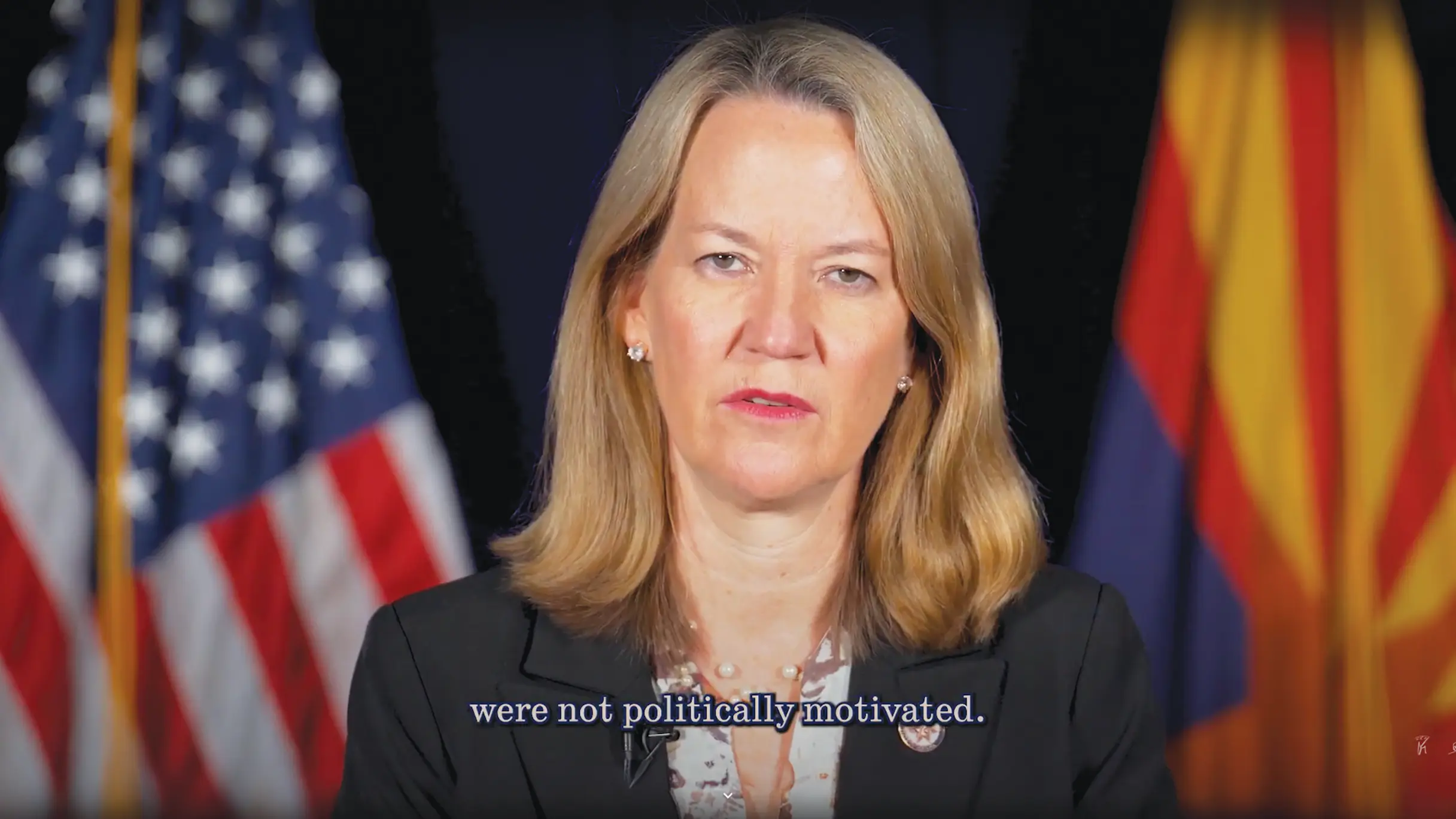ARIZONA — Arizona Attorney General Kris Mayes has defended her office›s prosecution of 18 individuals accused of conspiring to overturn the state›s 2020 presidential election results. The defendants include 11 Republican Party officials and several former Trump campaign attorneys and advisers who allegedly participated in a scheme to submit false documents claiming that then-President Donald Trump had won Arizona›s electoral votes, despite Joe Biden›s narrow victory in the state.
Mayes› statement comes in response to motions to dismiss the charges filed by the defendants, who argue that the prosecutions are politically motivated and an attempt to silence protected speech about the 2020 election. During a three-day hearing before Maricopa County Superior Court Judge Bruce Cohen, defense attorneys claimed that Mayes, a Democrat, had shown bias against Trump and his supporters.
In her press release, Mayes characterized the defendants› motions as «a distraction and an attempt to deflect from the facts of this case.» She emphasized that the indictments were the result of a thorough investigation conducted by law enforcement officers and prosecutors, and that they were issued by an independent grand jury composed of Arizona citizens who had reviewed the evidence and found sufficient cause to bring charges.
The Attorney General›s office has also pushed back against the defendants› claims that the case infringes upon their First Amendment rights, arguing that the actions in question do not constitute protected speech. «The law draws a clear line between free expression and illegal conduct, and we believe the evidence shows that the defendants crossed that line, Mayes asserted.
The Arizona case has its roots in the aftermath of the 2020 presidential election, which saw then-President Trump and his allies make numerous claims of widespread voter fraud and launch legal challenges in several swing states, including Arizona. Despite these efforts, state and federal officials, as well as multiple courts, found no evidence of fraud sufficient to alter the outcome of the election.
The indictments, issued in April 2024, charge the defendants with conspiracy, fraud, and forgery. They allege that the defendants knowingly participated in a scheme to submit false electoral documents to Congress, the National Archives, and other government entities in an attempt to obstruct the certification of Joe Biden›s victory in the state.
Among those indicted are Kelli Ward, the former chair of the Arizona Republican Party, and her husband Michael Ward. The indictment also names several attorneys who worked on Trump›s legal challenges to the election results, including Rudy Giuliani, who served as Trump›s personal attorney, and John Eastman, a conservative lawyer who played a key role in devising the legal strategy behind the efforts to overturn the election.
Since the indictments were handed down, two of the original 18 defendants have resolved their cases. In August, Jenna Ellis, a former Trump campaign attorney, entered into a cooperation agreement with prosecutors, leading to the dismissal of charges against her. Weeks later, Loraine Pellegrino, one of the 11 Republican Party officials accused of signing the false electoral documents, pleaded guilty to a misdemeanor charge and was sentenced to three years of probation.
The remaining 16 defendants have pleaded not guilty and are set to face trial beginning on January 5, 2026. As the case proceeds, it has drawn significant attention both within Arizona and across the nation, as it represents one of the most high-profile attempts to hold individuals accountable for efforts to undermine the 2020 election.
The outcome of the Arizona case could have implications for the future of American democracy. As the nation continues to grapple with the fallout from the 2020 election and the ongoing threat of misinformation and conspiracy theories, the prosecution of those accused of attempting to subvert the will of the voters sends a message about the importance of upholding the rule of law and safeguarding the integrity of the electoral process.
During the dismissal hearings, defense attorneys claimed that the indictments are an attempt to criminalize political speech and that the defendants were merely exercising their First Amendment rights when they challenged the election results and submitted the alternate electoral documents.
However, prosecutors have countered that the defendants› actions went beyond mere political speech and constituted a deliberate attempt to obstruct the lawful certification of the election results. They have pointed to evidence, including emails and other communications, that they say demonstrates the defendants› knowledge that their actions were unlawful and their intent to interfere with the electoral process.
Judge Cohen, who presided over the dismissal hearings, has not yet issued rulings on the defendants› motions. He has indicated that he will rule on each motion separately and has requested additional written arguments from both sides by September 6.
The Arizona case raises important questions about the role of political leaders and public officials in upholding the rule of law and the integrity of elections. As elected officials, the defendants in this case had a responsibility to respect the will of the voters and to abide by the legal processes that govern the electoral system.
The case also highlights the importance of active engagement by citizens in defending democratic institutions. It is up to members of a free and open society to remain informed, to participate in the political process, and to hold leaders accountable when they fail to uphold the principles and values that define the nation.
As the Arizona fake electors case moves forward, it is likely to continue to generate public interest and debate. The ultimate outcome remains to be seen, but the case serves as a reminder of the ongoing need to preserve and protect the democratic process.
–Stephan Lightman
Lake Havasu Annual Holiday Boat Parade of Lights returns for 2024
LAKE HAVASU — Lake Havasu City, Arizona, will once again come alive with holiday spirit on...
Read More























